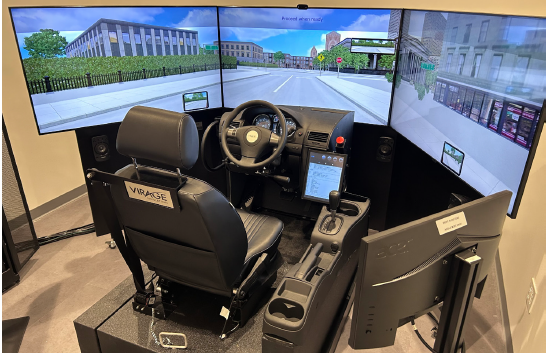S+S, Fall 2023
The Vision Institute at UPMC Mercy Pavilion has two unique programs for people with low vision: a StreetLab and a driving simulator.
The Pittsburgh StreetLab for Low Vision Research is the first clinical research facility in Western PA dedicated to the enhancement and maintenance of independence in people with low vision, run by Rakie Cham, PhD, professor in the Departments of Bioengineering, Ophthalmology, and Physical Therapy at the University of Pittsburgh. She is part of the Human Movement and Balance Laboratory (HMBL), housed in the Department of Bioengineering.
According to Dr. Cham, the Pittsburgh StreetLab will be a state-of-the-art collaborative environment in which patient-centric interdisciplinary research will be conducted in four focus areas: evaluation of the needs of patients with low vision, qualitative and quantitative assessments of capacity in multiple domains, e.g., mobility, navigation, dexterity, etc., evaluation of current interventions and technologies, and developing new and innovative solutions.
The StreetLab looks like a small movie studio. The lighting and sound can be set to create the type of environment according to the desired study protocols. Some props can be used to make SteetLab look like a street, café, or just an obstacle course. Cameras are mounted high on the walls around the room and the subjects wear captors and eye trackers to create an avatar image to analyze gate and eye movements.
The facility will be used by a team of investigators from the University of Pittsburgh, other national and international academic centers and industry. University of Pittsburgh investigators will include researchers with primary appointments in the School of Medicine, the Swanson School of Engineering, the School of Health and Rehabilitation Sciences, and Arts and Sciences.
“We believe that the research conducted in the Pittsburgh StreetLab for Low Vision Research will ultimately improve the quality of life of patients with low vision conditions,” Dr. Cham said.
It is anticipated that the StreetLab will be fully operational by the end of October 2023.
The driving simulator – up and running since September — is a new acquisition to the low vision research and rehabilitation capabilities at the Vision Institute. Very few, if any, ophthalmology Departments in the U.S. have one, according to Clive D’Souza, PhD, MS, Assistant Professor in the Department of Rehabilitation Science & Technology, the Department of Industrial Engineering, and the Department of Ophthalmology.
The simulator features original vehicle components such as the steering wheel, gas/brake pedals, driver seat, and dashboard mounted on a wheelchair-accessible motion platform, a 180-degree field-of view using three large visual displays, blind spot displays, and surround sound audio feedback. The motion platform is calibrated to reproduce movement cues exactly corresponding to the driver’s responses. The software program running the simulator contains a wide range of customizable driving scenarios from basic to more complex situations, safe to more hazardous road conditions, and impaired and distracted driving.
Ongoing plans include adding sophisticated instrumentation to obtain objective measurements of driver behavior and performance, like eye tracking to understand the driver’s visual behavior, and physiological sensors like heart rate to quantify the driver’s cognitive workload.
Driving is one of the most important functions to help people maintain their independence. The driving simulator provides the capability to assess the driving performance of low vision patients in a safe and controlled environment. Researchers will also be able to test the effectiveness of vision rehabilitation and therapies on driving ability and performance of low vision patients in a wide range of driving scenarios. “This creates new opportunities in both low vision driver rehabilitation, training, and research into interventions and innovative technology solutions to support safe driving in drivers with low vision,” Dr. D’Souza said.
